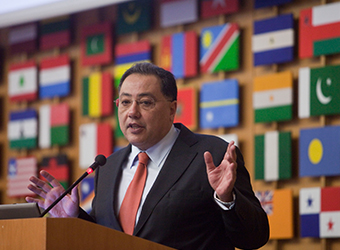The international community is keen to support Egypt’s economic reform experience and its ongoing economic development process, said World Bank’s vice president Hafiz Ghanem said Wednesday.
Ghanem made these remarks during his meeting with the Door-Knocking delegation, which is visiting Washington.
Despite the current economic difficulties Egypt is enduring, including the public debt that exceeded 100% of the GDP, the budget deficit, rising inflation, and the suffering of the poor, the economy still has good chances for growth, he added.
Ghanem attributed his positive outlook to the relative advantages gained by Egyptian exports, foreign investment, and the number of tourists visiting Egypt after the recent reform process and floatation of the Egyptian pound exchange rate.
He emphasized that these factors can make the difference in the Egyptian economy and lead to further growth and development, stressing the importance of the role of small and medium-sized industries in stimulating production and employment in Egypt.
Global studies have shown that more than two thirds of labourers around the world work in SME projects, which are characterized by low investment costs and the need for an average level of technology and know-how other than mega-projects. Therefore, the SME is more suitable for developing countries, including Egypt during the current period, Ghanem noted.
Banking Finance Strategy in Egypt
Ghanem referred to the need to make some changes in the financing strategy of banks, calling them to turn from their finances in government debt instruments, to instead support public sector and its projects.
He also stressed the great interest of the World Bank in the economic experience in Egypt, pointing out that Egypt ranks first in the volume of cooperation with the bank and holds the largest share of funding in the Middle East, followed by Iraq.
Moreover, Ghanem highlighted the areas that the Bank is interested in financing in Egypt; namely the sanitation, infrastructure, education, health, and all service projects that have a direct impact on the standard of living of individuals there. He stressed that Egypt’s request for any cooperation to carry out any of those projects is always met with the immediate approval from World Bank officials.
Wages Increase to Counter Inflation
Replying to Amwal Al Ghad’s question, Ghanem stressed that the current demands in Egypt for the need to increase the wages of workers to cope with the growing inflation as a result of the reform process are acceptable claims.
The increase in wages is due to the development of labour productivity and the increase in labour supply. He emphasised that if wages increased without increasing productivity, this will lead to more inflation as a result of the development of aggregate demand with limited growth in the supply side, along with the debt problem, in which the government should develop an appropriate strategy to confront currently.
He suggested that the problem of rising public debt should be addressed by increasing production and raising the level of GDP as well as reducing government spending and channeling support to the poor through a transformation process that includes the transfer of in-kind support for easy cash control.
The Ideal Development Model
The World Bank official also stressed that the most important model for the growth that Egypt and all countries should follow is keeping an integrated growth that balances the considerations of both development and justice and that makes the poor and the marginalized at the top of the ranks benefiting from the economic growth.
The Tunisian economy is an example; it has achieved a high growth rate of 5 percent on average during the pre-revolution years. Yet as a result of the uneven distribution of this growth among the people, it has witnessed the spread of poverty and unemployment, resulted eventually to the people’s revolution against the regime and its demolition in early 2011.
He added that all the funding granted by the World Bank to various countries is strictly controlled in spending to prevent it from being exposed to corruption and theft. Ghanem pointed out that any operations proved to be manipulated in any of the beneficiary countries of World Bank, funding is stopped and recovered, the matter which leads to immediate investigation in the corruption that led to this situation.


